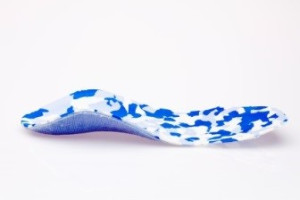Three Types of Orthotics
Monday, 09 December 2019 00:00 Orthotics are devices that are worn in the shoes which may help to correct foot structure. These are generally designed by a podiatrist who can determine the reason why wearing orthotics can be beneficial. Research has noted that there are three types of orthotics to choose from. People who participate in sporting activities that include jumping may benefit from wearing soft orthotics, as this may help to increase cushioning. Patients who have flat feet may find that wearing semi-rigid orthotics can help to provide the stability that is needed to accomplish daily activities. Wearing rigid orthotics may be beneficial in diminishing pain that can be present in patients who have neurological illnesses. If you have pain in your feet, it is advised that you consult with a podiatrist who can determine if wearing orthotics is right for you.
Orthotics are devices that are worn in the shoes which may help to correct foot structure. These are generally designed by a podiatrist who can determine the reason why wearing orthotics can be beneficial. Research has noted that there are three types of orthotics to choose from. People who participate in sporting activities that include jumping may benefit from wearing soft orthotics, as this may help to increase cushioning. Patients who have flat feet may find that wearing semi-rigid orthotics can help to provide the stability that is needed to accomplish daily activities. Wearing rigid orthotics may be beneficial in diminishing pain that can be present in patients who have neurological illnesses. If you have pain in your feet, it is advised that you consult with a podiatrist who can determine if wearing orthotics is right for you.
If you are having discomfort in your feet and would like to try orthotics, contact one of our podiatrists from Advanced Foot & Ankle Associates, PLLC. Our doctors can provide the care you need to keep you pain-free and on your feet.
What Are Orthotics?
Orthotics are inserts you can place into your shoes to help with a variety of foot problems such as flat feet or foot pain. Orthotics provide relief and comfort for minor foot and heel pain but can’t correct serious biomechanical problems in your feet.
Over-the-Counter Inserts
Orthotics come in a wide variety of over-the-counter inserts that are used to treat foot pain, heel pain, and minor problems. For example, arch supports can be inserted into your shoes to help correct overarched or flat feet, while gel insoles are often used because they provide comfort and relief from foot and heel pain by alleviating pressure.
Prescription Orthotics
If over-the-counter inserts don’t work for you or if you have a more severe foot concern, it is possible to have your podiatrist prescribe custom orthotics. These high-quality inserts are designed to treat problems such as abnormal motion, plantar fasciitis, and severe forms of heel pain. They can even be used to help patients suffering from diabetes by treating foot ulcers and painful calluses and are usually molded to your feet individually, which allows them to provide full support and comfort.
If you are experiencing minor to severe foot or heel pain, it’s recommended to speak with your podiatrist about the possibilities of using orthotics. A podiatrist can determine which type of orthotic is right for you and allow you to take the first steps towards being pain-free.
If you have any questions please contact one of our offices located in Lake Worth and Aledo/Willow Park, TX . We offer the newest diagnostic and treatment technologies for all your foot and ankle needs.
Blog Archives
- April 2025
- March 2025
- February 2025
- January 2025
- December 2024
- November 2024
- October 2024
- September 2024
- August 2024
- July 2024
- June 2024
- May 2024
- April 2024
- March 2024
- February 2024
- January 2024
- December 2023
- November 2023
- October 2023
- September 2023
- August 2023
- July 2023
- June 2023
- May 2023
- April 2023
- March 2023
- February 2023
- January 2023
- December 2022
- November 2022
- October 2022
- September 2022
- August 2022
- July 2022
- June 2022
- May 2022
- April 2022
- March 2022
- February 2022
- January 2022
- December 2021
- November 2021
- October 2021
- September 2021
- August 2021
- July 2021
- June 2021
- May 2021
- April 2021
- March 2021
- February 2021
- January 2021
- December 2020
- November 2020
- October 2020
- September 2020
- August 2020
- July 2020
- June 2020
- May 2020
- April 2020
- March 2020
- February 2020
- January 2020
- December 2019
- November 2019
- October 2019
- September 2019
- August 2019
- July 2019
- June 2019
- May 2019
- April 2019
- March 2019
- February 2019
- January 2019
- December 2018
- November 2018
- October 2018




